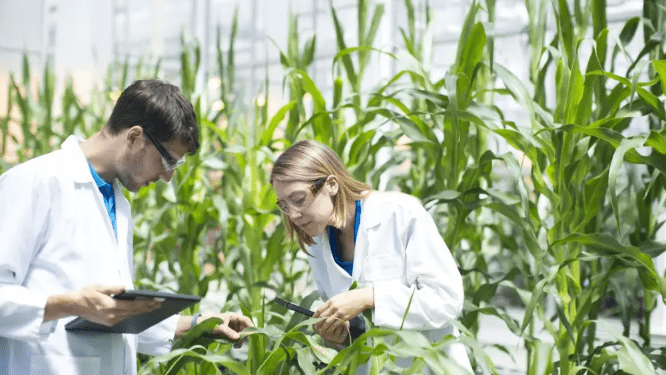
How Biotechnology is Transforming the Agriculture Sector?

Agriculture has historically served as both a primary and a secondary means of providing food and nourishment for both people and animals. Farmers use performance-oriented instruments like the Mahindra Rotavator for better productivity. However, Agriculture is today beset by a slew of challenges. It includes changing weather patterns, the burden of large-scale grain production, pest disruption, etc. These agricultural biotechnology issues can be reduced by adopting plant breeding techniques.
The ability of this technology to transfer genes from any source to plants is its strength. Additionally, nanotechnology provides up a tremendous opportunity for novel agricultural biotechnology usage.
What is Biotechnology?
Biotechnology is the application of biological methods to develop and manufacture products in numerous aspects of human existence.
The primary purpose of current biotechnology in agriculture is to increase the quality, quantity, nutrition, flavour, and longevity of crops, allowing stakeholders to achieve higher output with lower energy expenditures. It encompasses ancient agricultural practices such as fermentation and more contemporary examples of producing disease-resistant plants through cross-breeding.
Modern strategies for improving agricultural practices through biotechnological development include transgenic procedures, which involve inserting DNA from other countries’ strands into the host genome to increase crop productivity.
The Use of Biotechnology in Agriculture
Landowners can use biotechnology to make output more cost-effective and sustainable. Most biotechnology crops, for instance, can be modified to withstand specific herbicides. It can make weed management easier and more effective.
Some crops have been genetically modified to be resilient to specific plant illnesses and insect pests. It can make pest control simpler and more efficient and reduce the usage of synthetic pesticides. These crop production techniques may assist countries in meeting their food requirements while lowering production costs.
Many additional crops are currently in the research and growth stages. While it is impossible to predict which will eventually come to the realization, biotechnology will undoubtedly have a wide range of agricultural applications in the future. Biotechnology advancements may supply customers with foods that are more nutritious, last longer or have lower amounts of certain naturally produced toxicants in certain plant-based foods.
How Biotechnology is Beneficial for Agriculture?
Landowners, producers, and customers have benefited from using biotechnology in farming. Biotechnology has made the control of insect pests and weed management simpler and more secure while protecting crops against illness.
For instance, genetically modified insect-resistant cotton has significantly reduced the usage of persistent, toxic pesticides that can harm groundwater and the natural world.
Herbicide-tolerant soybeans, cotton and maize, allow for the use of lower-risk herbicides. It can break down faster in soil and is safe for animals and humans. Herbicide-tolerant crops are especially well-suited to no-till or reduced-tillage agriculture techniques. It further helps to protect topsoil from erosion.
Biotech crops can boost productivity and, in some situations, yields, making farming more lucrative. Several crops can help farmers streamline their job and increase their safety. Farmers can now spend less time monitoring their crops and more on other profitable pursuits.
Biotechnology’s Significance in Agriculture
Biotechnology’s contribution to agriculture is varied. Some of the most common advantages of biotechnology in agriculture are as follows:
Rise in Crop Production
Biotechnology significantly increases crop output by improving disease prevention and increasing tolerance to drought and flooding. It not only meets the ever-increasing demand for food but also assists farmers in reducing losses.
Improved Crop Production
Biotechnology approaches provide cost-effective methods for solving pest concerns. Farmers have successfully transformed crops such as cotton, maize and potato to produce a protein which successfully combats pest concerns.
Boost in Nutritional Value
It has also helped farmers grow foods with increased nutritional content and improved flavour and texture. For example, technology has enabled the cultivation of soybeans with a high protein level, beans with higher levels of amino acids, and potatoes with starch.
Fresher Produce with Better Taste
It also helps enhance crop flavour and taste by increasing the production of enzymes found in plants. It also aids in keeping the crop fresh for a longer period.
Tolerance to Chemicals
Most farmers use pesticides to suppress weed growth, frequently resulting in soil erosion. However, genetically altered food is resistant to various pesticides, including herbicides; consequently, soil erosion is much smaller.
Conclusion
Biotechnology in agriculture involves the creation of transgenic crops, which are created by inserting genes into plants that provide the crop with a favourable characteristic.
Genetically modified foods can tackle food security and hunger issues. They contribute to environmental protection and preservation by improving yield. They lessen the need for chemical-based pesticides and herbicides. Farmers can also minimize their burden by knowing the Sonalika Rotavator Price to get the best tools and machines for accomplishing agriculture-related tasks.
Plants resistant to insects, herbicides, and diseases can be conveniently grown thanks to improvements in agriculture biotechnology and the use of particular procedures. However, governments have numerous obstacles in safety examination, regulation, global policy, and food labelling.